Clifford Garstang's Blog, page 18
May 13, 2022
I’ve Got Questions for Valerie Nieman
Editor’s Note: This exchange is part of a series of brief interviews with emerging writers of recent or forthcoming books. If you enjoyed it, please visit other interviews in the I’ve Got Questions feature.
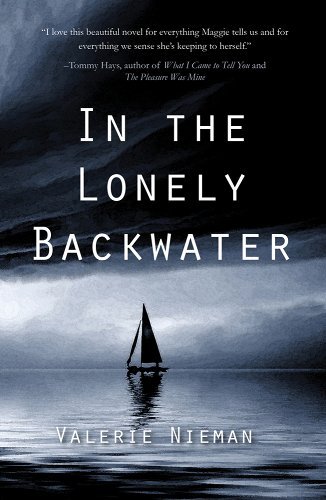 In the Lonely Backwater by Valerie NiemanWhat’s the title of your book? Fiction? Nonfiction? Poetry? Who is the publisher and what’s the publication date?
In the Lonely Backwater by Valerie NiemanWhat’s the title of your book? Fiction? Nonfiction? Poetry? Who is the publisher and what’s the publication date?In the Lonely Backwater. Fiction. Regal House/Fitzroy Books. May 10, 2022
In a couple of sentences, what’s the book about?A whip-smart outsider insecure in her sexual identity, a 17-year-old Maggie explores the North Carolina woods and avoids misery at home and school by communing with shadowy figures including a long-ago biologist. When her gorgeous cousin’s brutalized body is found at the marina where Maggie lives with her alcoholic father, a persistent detective intimates that she’s the prime suspect—and this backwater world, where people perpetually reinvent themselves to survive, suddenly becomes more complex and dangerous.
What’s the book’s genre (for fiction and nonfiction) or primary style (for poetry)?YA/crossover thriller
What’s the nicest thing anyone has said about the book so far?“This novel is an intricate and intriguing work of art. Its intricacies are not mere twists of plotline; they are necessary and inevitable. They define, redefine, in a serious manner the term, mystery.” ~Fred Chappell, novelist, poet, Bollingen Prize winner, former North Carolina Poet Laureate (in StorySouth)
What book or books is yours comparable to or a cross between? [Is your book like Moby Dick or maybe it’s more like Frankenstein meets Peter Pan?]Wow. I don’t know where to begin. People have compared it with Where the Crawdads Sing and The Girl on the Train. I think it is its own beast, marked by the obsessions of its narrator and her need to categorize the world in order to live within it.
Why this book? Why now?I’ve never been able to choose a story—the story has chosen me. Threads that came together to launch the writing of In the Lonely Backwater included time sailing on a North Carolina lake, my lifelong predilection for solo wandering in the woods, and finding my senior yearbook with an enigmatic inscription about an argument I don’t recall.
Other than writing this book, what’s the best job you’ve ever had?Retirement. I ended a 20-year second career as a creative writing professor at North Carolina A&T State University last year— that would be my other best job!
What do you want readers to take away from the book?I think in hindsight I’ve been struck with how the two young women reflect and refract ideas about what it means to be female and how those definitions can be a trap. Maggie isn’t sure about her sexuality and is not willing to compete in the accepted standards of beauty. Charisse is beautiful, by anyone’s gauge, but she’s torn between the fundamentalist purity demands of her family and her own sexuality. She’s been taught that she needs to please men, and that puts her in a hazardous place.
What food and/or music do you associate with the book?As Maggie and her dad are reconciling, he brings home a special treat from the convenience store, sausage biscuits. “We tore into them like wolves, the biscuits thick and crumbly, the sausage a little on the hot side with red flecks of pepper showing in the meat. They were about the best things you could get, and I dabbed up the crumbs with my fingers and we didn’t leave anything when we were done but greasy papers.”
What book(s) are you reading currently?I’m reading books by other Regal House authors in preparation for podcasts and panels, including Judith Turner-Yamamoto, Michael Bourne, Karla Huebner, Frank Morelli, and Culley Holderfield. I read The Savage Ones by John Copenhaver and have just finished Georgann Eubanks’s wonderful book about rare plants, Saving the Wild South. I think Maggie would read that book til it fell apart, just like her Linnaeus volume.
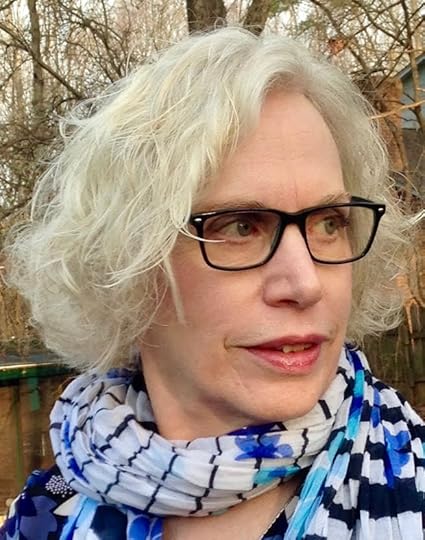 Valerie Nieman
Valerie NiemanLearn more about Val on her website.
Follow her on Facebook, Twitter, Instagram, LinkedIn, and Goodreads.
Buy the book from the publisher (Regal House/Fitzroy Books), Amazon, Barnes & Noble, or Bookshop.org.
May 2, 2022
I’ve Got Questions for Diane Josefowicz
Editor’s Note: This exchange is part of a series of brief interviews with emerging writers of recent or forthcoming books. If you enjoyed it, please visit other interviews in the I’ve Got Questions feature.
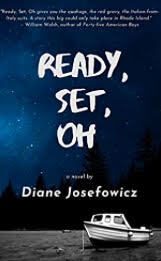 Ready, Set, Oh by Diane JosefowiczWhat’s the title of your book? Fiction? Nonfiction? Poetry? Who is the publisher and what’s the publication date?
Ready, Set, Oh by Diane JosefowiczWhat’s the title of your book? Fiction? Nonfiction? Poetry? Who is the publisher and what’s the publication date?Ready, Set, Oh. Fiction. Flexible Press, May 3, 2022.
In a couple of sentences, what’s the book about?Set against the upheavals of the Sixties in Providence, Rhode Island, Ready, Set, Oh chronicles the struggles of a young man who has just lost his draft deferment, his troubled and unexpectedly pregnant girlfriend, and a UFO-chasing astronomer – all of whom are hostages in their own ways to their families and to history.
What’s the book’s genre (for fiction and nonfiction) or primary style (for poetry)?It’s character-driven literary fiction.
What’s the nicest thing anyone has said about the book so far?Jacob Appel, the author of Einstein’s Beach House and approximately eighteen other books, called it “a stunning debut” that “finds the large truths in our smallest state, leaving an indelible mark on our broader literary landscape.”
What book or books is yours comparable to or a cross between? [Is your book like Moby Dick or maybe it’s more like Frankenstein meets Peter Pan?]Ready, Set, Oh has drawn comparisons to Ann Patchett and Richard Russo, and who knows, those comparisons might be apt—but quite a few of the novel’s details—UFO sightings, time-keeping mechanisms from ancient Greece, weird campus ephemera, a pet dolphin in a backyard pool—veer away from the psychological realism characteristic of both authors. Certainly as I was writing, I was drawn to wilder stuff, like Richard Fariña’s zany 1960s classic, Been Down So Long It Looks Like Up To Me.
Why this book? Why now?When I finished the novel in 2009, I heard the same complaint from agents and editors: We simply can’t keep talking about the Sixties. We’re done with it. But if the past six years have made anything clear, it’s that we’re not nearly “done with it,” and so the novel seems to have found its moment. As the civil rights activist Angela Davis says, “freedom is a constant struggle.” For my characters, who are politically uncommitted and actively avoiding the commitment that effective politics requires, that struggle happens within themselves and inside their families. It’s intimate, it’s personal, it’s individualistic—and they don’t get very far. But I would say that we haven’t gotten very far, either. Civil rights, voting rights, women’s rights, the rights of LGBTQ+ individuals, press freedom, the dismantling of judicial mechanisms, the loss of ordinary political norms, I could go on and on—so much is being rolled back at light speed, as if the safeguards against illiberal and hateful ideologies were somehow insubstantial and easily undermined. Among other things, the novel is an attempt to reckon with that vulnerability, to make sense of it as something rooted in the unfinished business of the Sixties.
Other than writing this book, what’s the best job you’ve ever had?Since it’s a volunteer position, I wouldn’t exactly call it a job, but I do love editing book reviews for Necessary Fiction. We publish weekly reviews of new works of prose fiction in English from small presses, with a special emphasis on translations. It’s great to have a finger on the pulse of small press publishing where so much great work is being done right now.
What do you want readers to take away from the book?One of my favorite writers, the novelist Edie Meidav, described Ready, Set, Oh as “a spyglass shaped by a historian’s sensibility, offering a peek into an era with ironies and hopes in backtalk to our own,” and I think she put her finger on my intention exactly: to tell a story from the past in a way that illuminates our current predicaments.
What food and/or music do you associate with the book?While I was writing, I was acutely aware of how my present-day concerns were interacting with my historical material. Looking for inspiration, or maybe just company, as I tried to balance the present and the past, I started listening to contemporary covers of late Sixties hits. These musicians were time-traveling in a way that I recognized and aspired to, being boldly themselves while also being in deep conversation with their antecedents. One cover I particularly love is Sarah McLachlan’s of “Wear Your Love Like Heaven,” Donovan’s now-forgotten 1967 classic of psychedelic pop. It’s just the sort of song that Primrose Tirocchi, the troubled pregnant girl at the center of Ready, Set, Oh, would have adored. McLachlan’s cover, and a few others, appear on this playlist.
What book(s) are you reading currently?I’m dipping in and out If That Mockingbird Don’t Sing, a new and exceptionally rich anthology of flash stories on parenting edited by Hannah Grieco. The volume collects more than seventy powerfully distilled images of the truly sticky underbelly of parenting. We tend to idealize both parenthood and childhood, but these writers have set out to capture emotional facets of parenting that don’t get much play—frustration, rage, grief, and perhaps above all, the wild fear that makes parenting (and parents) at times so scary.
 Diane Josefowicz
Diane JosefowiczLearn more about Diane on her website.
Follow her on Twitter, Facebook, and LinkedIn.
Buy the book from the publisher (Flexible Press), Amazon, or Bookshop.org.
May 1, 2022
2022 Reading — April

Interior Chinatown by Charles Yu is . . . clever. The book is a faux screenplay that illustrates the invisibility of Asians in America, both in the entertainment industry, where they were for a long time (still?) confined to roles that could be described as “Generic Asian Guy,” “Old Asian Woman,” and the like, but also in the larger context where they were also nearly invisible. In that context they all seem to work in a Chinese restaurant in Chinatown at the same time they are also extras in various episodes of an ongoing crime drama called Black and White. The point is fairly blunt, which is that white people have treated Asians like shit since they first started coming to this continent. It’s a little over-generalized for my taste. The point might have been made better with a narrative of specifics, although the clever structure might have been lost. Interior Chinatown won the National Book Award in 2020.

The Sentence by Louise Erdrich is an odd novel by a writer I’ve long admired. I picked this up when it first came out—got a signed first edition—but I didn’t get to it until I convinced my book club to read it. Tookie works in a bookstore in Minneapolis that specializes in Native American books, but also carries a wide selection of . . . everything. (Erdrich herself owns such a bookstore.) She has a colorful past—she served time in prison for stealing a body (to which drugs were duct-taped, unbeknownst to her) and then on release married the former Tribal Cop who arrested her. (Some will find this premise implausible!) Tookie is haunted in the bookstore by the ghost of Flora, a woman who died reading a particular book, that becomes the center of the plot, around which topical issues circulate: climate change, historical (and contemporary) treatment of Native Americans, Black Lives Matter and the murder of George Floyd, and the pandemic. While all of these topics are important, at the heart of the book is the haunting by a customer who just won’t leave the store even after her death. And the haunting is very much about books, which also play an important role.

Go Tell it On the Mountain by James Baldwin is intense. According to my Goodreads account, I read this book in 2011, but I don’t see how that’s possible. I remembered nothing about it while reading it now. Possibly the difference is that this time around I listened to the audiobook version, while also consulting the printed copy I have. (The narrator, Adam Lazarre-White, is very good, although he could read a little faster, in my opinion.) In any event, it seems unforgettable to me. While the book is John’s story—the book takes place on his 14th birthday—we spend long sequences with other people in his life including his mother, stepfather, and his aunt, all of whom grew up in the south and eventually migrated north. The stepfather is a fantastic character—a charismatic preacher who is seriously flawed. The mother is a good woman who has had to put up with a lot in her life. And the aunt, who knows the stepfather’s past and won’t put up with his present hypocrisy, has also had it hard. The book is about both race and religion. The religion gets a little tedious, but at least it gives us some hope that young John will be all right.

Conversations with Friends by Sally Rooney is okay, I guess, but not really my kind of book. I think there really are books written to appeal more to women than to men, and this is one of them. Set in Ireland, two young women are on their summer break from college and get to know a somewhat successful writer/photographer and her husband, a handsome actor. Frances, the narrator of the story, proceeds to have an affair with the actor. The affair is conducted under the nose of the wife and friend, who eventually make Frances’s life uncomfortable. I can’t stand any of these people, and don’t find any of them the least bit interesting or sympathetic. Ultimately, this one was very unsatisfying.

These Precious Days by Ann Patchett is a collection of essays by one of my favorite novelists. Three of the essays were already familiar to me as I’d enjoyed them in The New Yorker, but there are many others, some long, some short, that I didn’t know and thoroughly enjoyed. These personal essays are not of the kind where the writer relates personal experience to a larger issue, unless that would include the human condition. For the most part, these are memoir. For example, the title essay is about her relationship with a woman she got to know because she was Tom Hanks’s assistant, and Patchett was working with him as the narrator of the audio version of one of her novels. The woman is diagnosed with cancer and comes to stay with Patchett and her husband in Nashville while undergoing clinical trials for a new treatment. While one can draw larger conclusions from Patchett’s experience in this relationship, the point is the experience, not something larger. It’s probably even more moving for that.

Jinwar and Other Stories by Alex Poppe is a short collection of stories (although the title story is almost novella length). I was intrigued because the stories are set in Iraq or elsewhere featuring people who have served in Iraq or had another connection. I’ve read a number of books by veterans who served in Iraq or Afghanistan, and at least one by a journalist, but this author worked there in humanitarian aid, so brings a somewhat different perspective.

The Italian Professor’s Wife by Ann Redone is a collection of poetry, winner of the 2022 Press 53 Prize for Poetry. I attended a Zoom reading featuring the author and enjoyed the selections she read, which included both short poems and short excerpts from a faux screenplay. The book is quite fresh and interesting, as much for the gaps in what is not said as for the words on the page. It’s a short collection and fun to read.
April 11, 2022
Contemporary Korean Novels
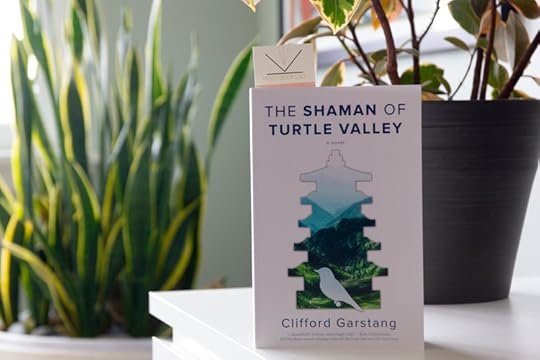
Recently, a fascinating website called Shepherd reached out to me and asked if I would be interested in a guest post on the site in connection with my novel, The Shaman of Turtle Valley. The novel, which is set mostly in Virginia but has several sections set in South Korea, is influenced by my experience living and working there, first as a Peace Corps Volunteer and later as a lawyer for The World Bank. I haven’t been back to Korea in a decade, but I do continue to watch from afar and I’ve become interested in Korean novels translated into English. (My Korean language skills, which were never great, after all this time are not up to the challenge of reading books in the original.)
Anyway, I selected five novels with which I had connected in the last few years and wrote about why. Please check out “The Best Books About Contemporary Korean Society.”
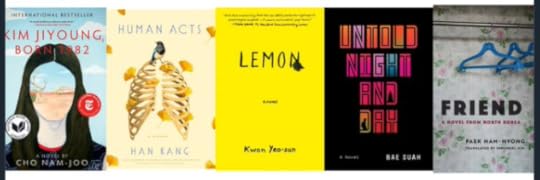
April 1, 2022
I’ve Got Questions for Joanne Durham
Editor’s Note: This exchange is part of a series of brief interviews with emerging writers of recent or forthcoming books. If you enjoyed it, please visit other interviews in the I’ve Got Questions feature.
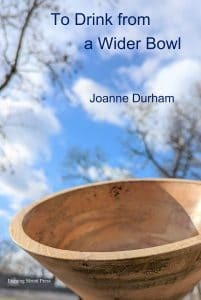 To Drink from a Wider Bowl by Joanne DurhamWhat’s the title of your book? Fiction? Nonfiction? Poetry? Who is the publisher and what’s the publication date?
To Drink from a Wider Bowl by Joanne DurhamWhat’s the title of your book? Fiction? Nonfiction? Poetry? Who is the publisher and what’s the publication date?To Drink from a Wider Bowl – Winner of the 2021 Sinclair Poetry Prize, Evening Street Press, April 1, 2022
In a couple of sentences, what’s the book about?The book is a collection of 49 poems in a narrative arc that takes the reader from grandparents to grandparenthood. In the words of poet and anthologist James Crews, the book is “a map of how to navigate our days with honesty, grace, and a deep mindfulness that leaves nothing unnoticed.”
What’s the book’s genre (for fiction and nonfiction) or primary style (for poetry)?These free-verse poems are accessible and lyrical. There’s humor, wordplay, and contemplation within vignettes of moments across my life.
What’s the nicest thing anyone has said about the book so far?I received this response on Goodreads: “Your poems dazzle! I read them all. I can’t say enough about how you have exquisitely woven the intimacy of your life and your history into poems that are truly memorable. The joys and sorrows of being human. The arc of the generations captures my heart.” Another reader said that they never liked poetry, but after reading my book, they’ve changed their mind.
What book or books is yours comparable to or a cross between? [Is your book like Moby Dick or maybe it’s more like Frankenstein meets Peter Pan?]People have told me that they like my poems because I don’t quite sound like anybody else. I hold a combination of Naomi Shihab Nye and Ellen Bass as poets I most strive to learn from and emulate.
Why this book? Why now?We live in a world with much cruelty, injustice, and despair. Even people who thought they were protected from these things are wondering how long we will survive. I think when we view ourselves and our world openly and honestly, we have the best chance to navigate to a better place. Poetry allows me to see things holistically, how I’m connected to everyone else, and hold strength and beauty alongside fear and anger. My poems emerge from that perspective, and I hope they elevate the spirits of readers.
Other than writing this book, what’s the best job you’ve ever had?Teaching kids from many backgrounds and cultures in public elementary schools. They were so full of promise and surprises.
What do you want readers to take away from the book?The epigraph at the beginning of my book, from a poem by Naomi Shihab Nye, says, “Maybe if we reinvent whatever our lives give us, we find poems.” I want my poems to lead readers to the poetry in their own lives.
What food and/or music do you associate with the book?Borushnuck, the name my father made up for a rolled donut I wouldn’t try until he gave it that name – one of my earliest introductions to wordplay. I sing “In My Life” by the Beatles as a bedtime song when I visit my grandson, who inspired many of these poems.
What book(s) are you reading currently?In my book club, I just finished We Had a Little Real Estate Problem: The Unheralded Story of Native Americans & Comedy by Kliph Nesteroff. I’m reading the wonderful poems and essays in All We Can Save: Truth, Courage and Solutions for the Climate Crisis. I read lots of poetry online daily. Some of the poetry books on my desk right now are Elizabeth Johnston Ambrose’s chapbook, Imago, Dei, Kai Coggin’s Mining for Stardust, Susan Vespoli’s Blame it on the Serpent.
 Joanne Durham
Joanne DurhamLearn more about Joanne on her website.
Follow her on Twitter and Instagram.
Watch Joanne read from the book at 3d Wednesday’s YouTube Channel.
Buy the book from the publisher (Evening Street Press).
March 31, 2022
2022 Reading–March
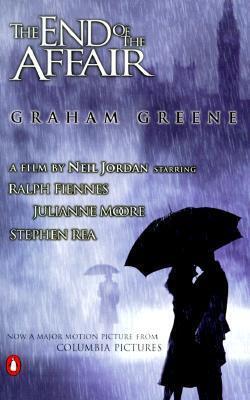 The End of the Affair by Graham Greene
The End of the Affair by Graham GreeneThe End of the Affair by Graham Greene is an older novel that was made into a movie several years ago that I haven’t seen. Now I don’t think I need to see it, as I listened to the audiobook version of the novel while also perusing a physical copy I happened to have. It was good, but tedious, as the narrator, a novelist, is so bloody neurotic that he’s a bit hard to take. Bendrix has an affair that is abruptly called off by the woman, and even after he reads her diary and learns exactly why she did it, he still doesn’t understand because he refuses to accept that anyone can believe in God. So, he loves the woman, but he also hates her, and he goes to extreme lengths to prove to himself why he should hate her. Glad to have read it finally.
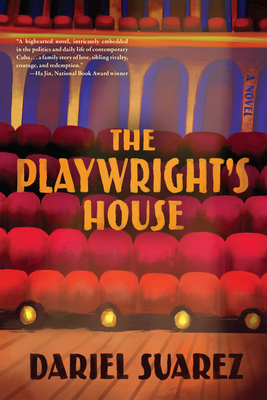 The Playwright’s House by Dariel Suarez
The Playwright’s House by Dariel SuarezThe Playwright’s House by Dariel Suarez is another of the books for a panel I moderated at the Virginia Festival of the Book in March. Set in Havana, this is the story of a Cuban playwright and his sons, told mostly from the point of view of Serguey, the older son. Early in the book, Felipe, the father, is arrested by state security. Serguey, who is a lawyer at the foreign ministry, and the younger brother, Victor, do their best to find out what is going on, but the corruption and evil of the regime keep thwarting them. Even trying to help his father puts Serguey’s career in jeopardy, which will have an impact on the relatively comfortable lifestyle he and his wife lead. The author, who came to the US from Cuba with his family, does a terrific job of painting a picture of the difficult conditions in that country.
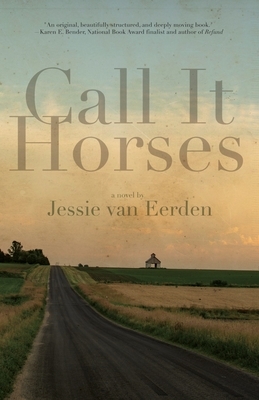 Call it Horses by Jessie van Eerden
Call it Horses by Jessie van EerdenCall it Horses by Jessie van Eerden, also one of the books for the panel I moderated at the Virginia Festival of the Book, is a lyrical novel about a road trip from a small town in West Virginia toward New Mexico (spoiler alert: they don’t get that far). It takes the form of a letter to a woman named Ruth, who, it develops early on, is actually the dead lover of the narrator’s aunt. The narrator and the aunt, who is suffering from lung cancer, are heading west to the desert, in part because of a fascination with Georgia O’Keefe, and they’ve also ended up with Nan, another woman from the town. Much of the story is revealed in flashbacks during the road trip, and the reader sees the narrator becoming the woman she is.
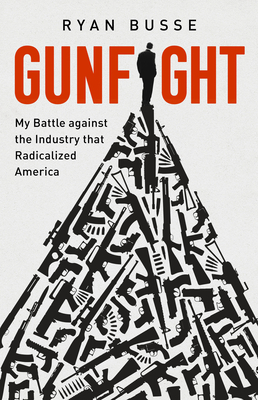 Gunfight by Ryan Busse
Gunfight by Ryan BusseGunfight: My Battle Against the Industry That Radicalized America by Ryan Busse was my book club’s selection for March. I found it fascinating and very readable. Busse, who grew up with guns, spent a career in sales for Kimber, an American gun manufacturer that specialized in high-end rifles and, later, pistols. They prided themselves on the fact that theirs were not the sort of weapons that would turn up at crime scenes. He was very good at what he did but eventually he got fed up with changes in the industry as the NRA turned gun ownership into a political statement. He is a true conservationist, so he turned away from the Republican Party when party leaders wanted to open public lands to drilling for oil and gas. While Busse is an avid hunter, he—and only a few others in the industry—saw no need for the “black rifles” and assault-style weapons that gradually became extremely popular. He spoke up and eventually had to leave the industry. While it’s definitely worth reading, one does have to wonder why it took him so long to quit. Presumably he was earning a good income, but the long goodbye makes him seem far less heroic than he portrays himself.
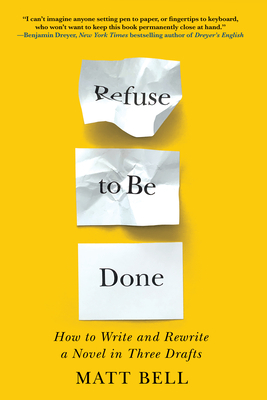 Refuse to Be Done by Matt Bell
Refuse to Be Done by Matt BellRefuse to be Done: How to Write and Rewrite a Novel in Three Drafts by Matt Bell is a compact little book that is useful at any stage of the novel-writing process. It’s divided into three sections, one for each of the “three drafts” referred to in the subtitle. I put “three drafts” in quotation marks, because I suspect that for a lot of writers there are far more drafts that litter the novel’s file on your computer for each novel you’ve finished. Still, for me, they do reflect, basically, the drafts Bell is talking about. It’s just that it took me three or four drafts to finish the “first draft,” and several drafts later I’m nearing completion of the “second draft.” It’s possible that the “third draft” will be done in only one draft, but that remains to be seen. In any event, the book has lots of valuable tips, and I’m planning to closely re-read the “third draft” section when I prepare to enter that stage.
March 25, 2022
I’ve Got Questions for Frances Park
Editor’s Note: This exchange is part of a series of brief interviews with emerging writers of recent or forthcoming books. If you enjoyed it, please visit other interviews in the I’ve Got Questions feature.
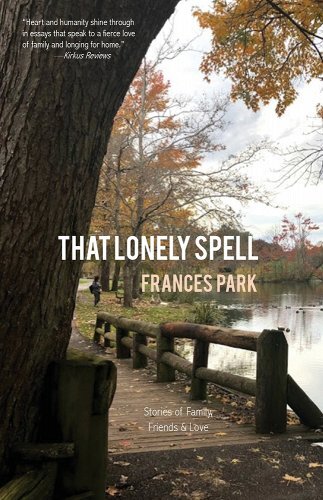 That Lonely Spell by Frances ParkWhat’s the title of your book? Fiction? Nonfiction? Poetry? Who is the publisher and what’s the publication date?
That Lonely Spell by Frances ParkWhat’s the title of your book? Fiction? Nonfiction? Poetry? Who is the publisher and what’s the publication date?TITLE: That Lonely Spell. Nonfiction. PUBLISHER: Heliotrope Books/March 25, 2022
In a couple of sentences, what’s the book about?Described by Kirkus Reviews as “A fresh take on the Korean memoir by a writer from a generation whose voice has seldom been heard”, That Lonely Spell is Love, Korean American Style – and the album of my life.
What’s the book’s genre (for fiction and nonfiction) or primary style (for poetry)?A memoir-in-essays
What’s the nicest thing anyone has said about the book so far?I get notes from readers all the time, but I’m particularly touched when I’m told that my words drew them in so deeply that they felt they were with me, experiencing what I was experiencing – right by my side.
What book or books is yours comparable to or a cross between? [Is your book like Moby Dick or maybe it’s more like Frankenstein meets Peter Pan?]On the Move: A Life by Oliver Sacks. I think we both tell our stories in honest, everyday yet poetic language. (On a side note: We also share prosopagnosia – face blindness – though his condition was more severe.)
Why this book? Why now?During a seven-year period beginning in late 2013, in between other writing projects, I penned personal essays without rules. Indulged myself with very candid, emotional pieces without second guessing a single thought. Along the way, all twenty-six works were accepted for publication, most by notable literary magazines. In the back-of-my-head, I was always wondering if I might find a book publisher for my collection. Fortunately, I did.
I believe prophesy was involved. Not having written a personal essay since college, I dug so deeply during the writing of That Lonely Spell there were times every cell in me felt altered. And during this period, nearly all the people I wrote about – including my three of my best friends, my confidants – died. On top of that, in 2019, my mom, alive to hear me read three of the five works dedicated to our life together following the early death of my father, also passed away. Three months before the Pandemic hit, I got divorced. Frankly, it’s like I sensed a true lonely spell coming all along.
Other than writing this book, what’s the best job you’ve ever had?I co-own a chocolate shop which has its insanely heavenly moments.
What do you want readers to take away from the book?I’d love to believe that a reader or two might be inspired to try their own hand at a personal essay. If you allow yourself to be honest, you learn a lot about yourself in the process.
What food and/or music do you associate with the book?I nibbled on countless dark chocolate bonbons during the writing of That Lonely Spell; I also listened to songs from the seventies mentioned in my memoir such as “Tell Me Something Good” and “Golden Lady”, songs that defined me then and even now.
What book(s) are you reading currently?No Death, No Fear by Thich Nhat Hanh
Show Up, Look Good by Mark Wisniewski
Sonju by Wondra Chang
 Frances Park
Frances ParkLearn more about Frances on her website.
Follow her on
Buy the book from the publisher (Heliotrope Books), Amazon, or Bookshop.org
I’ve Got Questions for Ginger Park
Editor’s Note: This exchange is part of a series of brief interviews with emerging writers of recent or forthcoming books. If you enjoyed it, please visit other interviews in the I’ve Got Questions feature.
 The Hundred Choices Department Store by Ginger ParkWhat’s the title of your book? Fiction? Nonfiction? Poetry? Who is the publisher and what’s the publication date?
The Hundred Choices Department Store by Ginger ParkWhat’s the title of your book? Fiction? Nonfiction? Poetry? Who is the publisher and what’s the publication date?The Hundred Choices Department Store, middle grade historical fiction. Regal House/Fitzroy Books. Pub date: March 25, 2022.
In a couple of sentences, what’s the book about?The book was inspired by my mother’s family who endured the Russian invasion of their hometown of Sinuiju in northern Korea prior to the outbreak of the Korean War. It’s 1944. The Pangs own a thriving department store that caters to wealthy Japanese clients. Meanwhile, thirteen-year-old Miyook Pang has spent two years serving in the war effort on behalf of Japan during the Japanese Occupation of her country. When she is sent to work at the dreaded dye factory, she meets an orphan boy who changes the course of her life.
What’s the book’s genre (for fiction and nonfiction) or primary style (for poetry)?Children’s Historical Fiction
What’s the nicest thing anyone has said about the book so far?Two reviews (partials):
One from an author: “This story preserves some of Ginger Park’s family history and allows readers to connect with a time they’ve never lived in and experiences they’ve never lived through. Miyook’s story is one of perseverance, beauty, pain, and resilience. Child readers will see themselves in Miyook and will learn and grow from Miyook’s story. What a beautiful gift Ginger Park has given the world.”
And one from a reader: “I really marvel at how much happens here within a very short period of time, within just 99 pages, all while keeping good time, good pace. Nothing seems rushed. The storytelling is great, which gives Hundred Choices a tone of magical realism amidst grim historical fiction. It’s sad and angry, but that sadness and anger is also checked by the backdrop of the forgiveness and acceptance of Christianity, the magic of memories and moments, and carrying them alive as culture. I really love how the family was depicted, how they’re all affected by war (and religion) in very different ways, and how this culminates into a familial truth that is almost as difficult to accept and forgive as war.”
But my mother’s response ―tears of joy and heartbreak―told me I had done my job.
What book or books is yours comparable to or a cross between? [Is your book like Moby Dick or maybe it’s more like Frankenstein meets Peter Pan?]While my book was inspired by personal events in my mother’s life, her experience is both unique and universal evidenced by an incredibly moving book The Night Diary by Veera Hiranandani. Both protagonists are young girls who must flee their homes due to war; both live in countries that will be divided into two countries (India and Pakistan, North Korea and South Korea); both take place in the 1940s.
Why this book? Why now?This story had been in my mind for decades, tucked away in a vault of ideas. But inspiration to write the book came when I realized the time I had left with my aging mom was on a clock. Together we dove into the past, mom reliving and I chronicling her memories. The Hundred Choices Department Store release date is March 25, in honor of mom’s birthday. Mom passed away in 2019―she would have been 92.
I truly believe in timing and my book comes at a much-needed time in our world. I woke up to the tragic news of Russia invading Ukraine. Following World War II, Russian soldiers invaded my mother’s hometown of Sinuiju and in that moment, my mother’s family was fated to lose everything―their department store, but worse, each other. History is repeating itself. It’s heartbreaking. And with the pandemic and anti-Asian sentiment on the rise, the American people are in dire need of healing. It’s my hope that a child reads my book and learns about another time and place, of people who are very different, but similar, too, with hopes and dreams and love of family, and that all of this will extinguish any negative thoughts or influence in their communities or cyberspace.
Other than writing this book, what’s the best job you’ve ever had?Cliff, I think you know the answer to this one―owning a chocolate shop! As a writer, I spend a large part of my life in my own thoughts. For over thirty-five years, my chocolate shop has allowed me to live in the real world and given me necessary balance―I drive into work thinking about the interesting conversations I’ll have with my beloved customers and the chocolates I’ll nibble on throughout the day. As I always say, it’s a sweet life.
What do you want readers to take away from the book?DCist reporter, Elliot Williams, who recently featured my book put it best: “The book plays with the idea that “small gestures are never forgotten,” and asks, “What would you risk for freedom?”
History is magnificent, but our magnifying glass is usually focused on famous historical figures. I hope my book prompts young (and adult) readers to delve into their own family tree―see what’s there. Undoubtedly, there are meaningful stories to discover.
What food and/or music do you associate with the book?Foods galore! Here’s a taste of the book (pun intended!). Lentil pancakes, mandu pork dumplings, honey cookies. “Ajumah and I had spent the morning making yakgwa, flower-shaped honey cookies garnished with a trio of pine nuts, traditionally served during the holiday. The delicious smell of dough frying in oil made my mouth water.”
Most symbolic, however, are lemon candies. Read the book to learn more!
As for music, only one reference to an old Korean folk song: “Arirang,” a love ballad about a man’s travails as he journeyed through a northern mountain pass.
What book(s) are you reading currently?I just finished two middle grade mysteries―Frank Morelli’s Breaking News and Diana Renn’s Trouble at Turtle Pond. Both fabulous Fitzroy titles.
Waiting to receive my copies of your book Oliver’s Travels and Stephanie Vanderslice’s The Lost Son. Can’t wait!
 Ginger Park
Ginger ParkLearn more about Ginger on her website.
Follow her on Facebook and Twitter.
Buy the book from the publisher (Regal House Publishing/Fitzroy), Politics & Prose Bookstore, Amazon, Barnes & Noble, or Bookshop.org.
March 20, 2022
I’ve Got Questions for Rebecca Baggett
Editor’s Note: This exchange is part of a series of brief interviews with emerging writers of recent or forthcoming books. If you enjoyed it, please visit other interviews in the I’ve Got Questions feature.
 The Woman Who Lives Without Money by Rebecca BaggettWhat’s the title of your book? Fiction? Nonfiction? Poetry? Who is the publisher and what’s the publication date?
The Woman Who Lives Without Money by Rebecca BaggettWhat’s the title of your book? Fiction? Nonfiction? Poetry? Who is the publisher and what’s the publication date?The Woman Who Lives Without Money (poetry), winner of the Terry J. Cox Poetry Award, will be published March 21, 2022 by Regal House Publishing in Raleigh, NC.
In a couple of sentences, what’s the book about?The collection spans the arc of a life, with focuses on the landscape of childhood, the natural world, loss, and regeneration. “The woman who lives without money” appears a touchstone for what is everlasting in a world where we face constant turmoil and change.
What’s the book’s genre (for fiction and nonfiction) or primary style (for poetry)?I write in free verse, with some of the poems in this collection (“The woman who lives without money” sequence and “A Few Blurbs from My First Book” are prose poems).
What’s the nicest thing anyone has said about the book so far?Two of my favorite comments are from fellow poets Eric Nelson and Sarah Gordon:
“Throughout this collection, Rebecca Baggett saves the world over and over again” (Nelson)
“Rebecca Baggett’s fine work should be celebrated by all who love language and what it can do to effect profound human communion.” (Gordon)
What book or books is yours comparable to or a cross between? [Is your book like Moby Dick or maybe it’s more like Frankenstein meets Peter Pan?]I believe my themes and the encompassing of a wider vision/natural world within a domestic theme might be reminiscent of poets like Maggie Smith, Barbara Crooker, Linda Pastan.
Why this book? Why now?When has the world needed poetry more than now? Through history, poetry has helped us voice the inexpressible and give the challenges of our time a face ‒ here we are again, desperate for a common voice, for a focus on what endures. My poetry offers a realistic gaze at our human situation but also a sense of hope, possibility, transience.
Other than writing this book, what’s the best job you’ve ever had?I worked for many years as an academic advisor for humanities majors in the arts and sciences college at the University of Georgia. I advised students majoring in subjects like theatre, linguistics, English, history, anthropology, classics, modern languages ‒ all the subjects with which my work and my heart engage as well. It was incredibly rewarding to be the person to whom they could bring fears and uncertainties and to listen to them find their way to studies that engaged and delighted them. I especially miss hearing what they’re reading, watching my students perform in plays on and off campus, and being able to learn all the contemporary slang right at its source!
What do you want readers to take away from the book?A sense of connection with the natural world, with their own history, with the common endeavors and struggle of humanity.
What food and/or music do you associate with the book?Elementary school lunchroom milk cartons and little cups of ice cream with the wooden paddle-spoons. Opening my lunchbox to find out what kind of sandwich, what fruit, (most important) what dessert I’d find today, and sharing around with my friends. The scents of fresh-made cotton candy on the boardwalk at Carolina Beach, the sweet sugar scent of Britt’s Donuts overlaid with the taste of salt from the ocean. Mixing fruitcake batter in my mom’s turkey roaster when she baked cakes to send “home” to Pennsylvania. Tables full of Lebanon bologna and pepper cabbage and mashed potatoes and pails of warm milk carried up to the kitchen from my uncle’s barn. The country cooking from my daddy’s family and my husband’s and Mama Bessie ‒ tiny corn bread fritters, fried chicken, creamed corn, red velvet cake, pecan pie. The grit of chickweed and wild violets in my teeth. The vats of coffee consumed while writing these poems, and the dark chocolate devoured in despair when they were rejected.
Music ‒ hmm. Unlike many of my family and friends, I don’t exactly have a “soundtrack” for my life. But I would say that writing these poems brought back some of the songs my mother sang to us at night, lullabies and popular songs from her own youth, and the hymns and Sunday school songs in my Methodist childhood, and the music of the waves that was the backdrop to my childhood, the calls of gulls and terns, and now the songs of sparrows and calls of owls and crows in my own suburban yard.
What book(s) are you reading currently?I always have multiple books on the go ‒ this week, I’m reading Vesper Flights, Helen Macdonald’s marvelous collection of essays on the natural world, Pat Barker’s The Ghost Road, the third volume of her WWI series, Isabel Wilkerson’s Caste, at a slow pace because it’s a hard (but essential) read, and the latest issues of The Sun, 32 Poems, Stone Gathering. My poetry stack includes recent work by Kai Coggin, Laure-Anne Bosselaar, Al Maginnes, and Pattiann Rogers. When I finish The Ghost Road, I’ll plunder the stack of novels beside my chair in the living room. If I hit a moment when I just need to get off this planet, I’ll reread Becky Chambers’ Wayfarer series, my most recent science fiction swoon.
 Rebecca Baggett
Rebecca BaggettFollow Rebecca on Facebook and Instagram.
Buy the book from the publisher (Regal House Publishing) or Bookshop.org.
March 16, 2022
Virginia Festival of the Book
The 2022 edition of the Virginia Festival of the Book begins today in Charlottesville. The COVID-19 pandemic has really done a number on literary festivals, and VA Book is no different. I had been scheduled to be on a panel at the 2020 festival to talk about my novel The Shaman of Turtle Valley, but the pandemic shut down much of the world and the Festival was canceled that year. The 2021 Festival was entirely virtual and I attended some events by Zoom. This year is a hybrid Festival–some events will be in person (with a few of those being live-streamed) and some will be virtual on Zoom.
I will be involved with two panels–one in person and one virtual.
The in-person panel is called Uncertainty Within: Literary Fiction and I’ll be joining novelists Sharon Harrigan and Lesley Wheeler for a reading and discussion moderated by Jody Hobbs Hessler. March 17, 4:00 pm, at the Central JMRL Library in Charlottesville. I’m really excited to talk about my book, Oliver’s Travels, which came out in May 2021, because it has still been hard to do in-person events and meet with readers.

On Saturday, March 19, at 2:00 pm, I’ll be moderating a panel called What We Call Family featuring three terrific novels that are very different but all having a focus on family and family obligations. I’m looking forward to discussing these books with Jessie van Eerden, Dariel Suarez, and Kyle Lucia Wu. (The event requires advance registration, but you can also stream it live on Facebook, I think.)
I hope you can attend these panel discussions or some of the many other events at the Festival.



